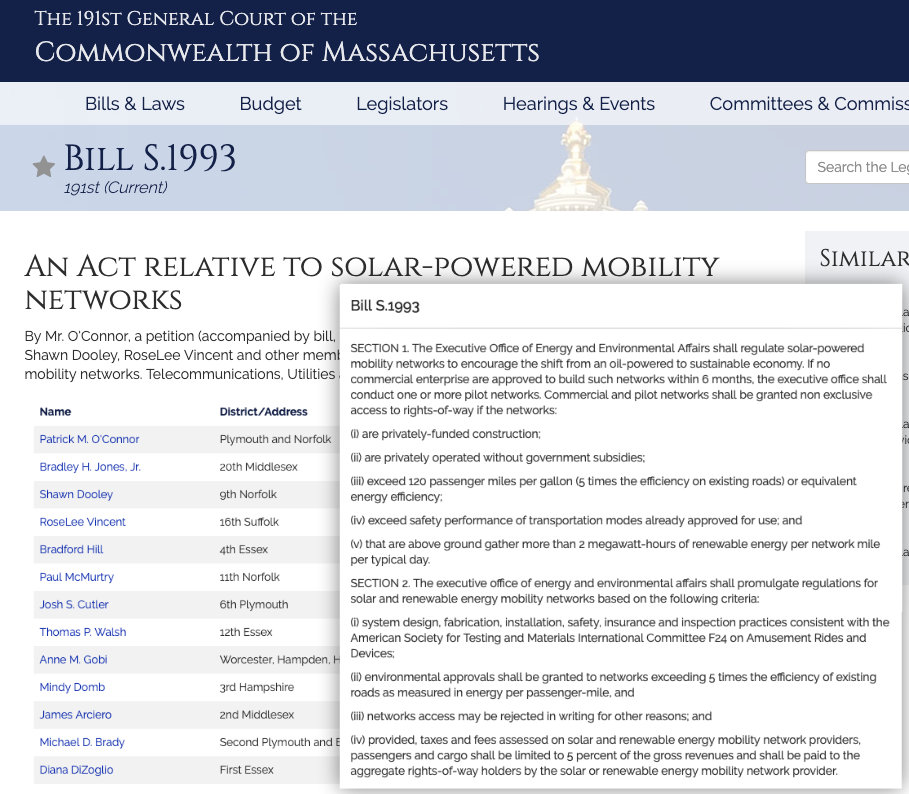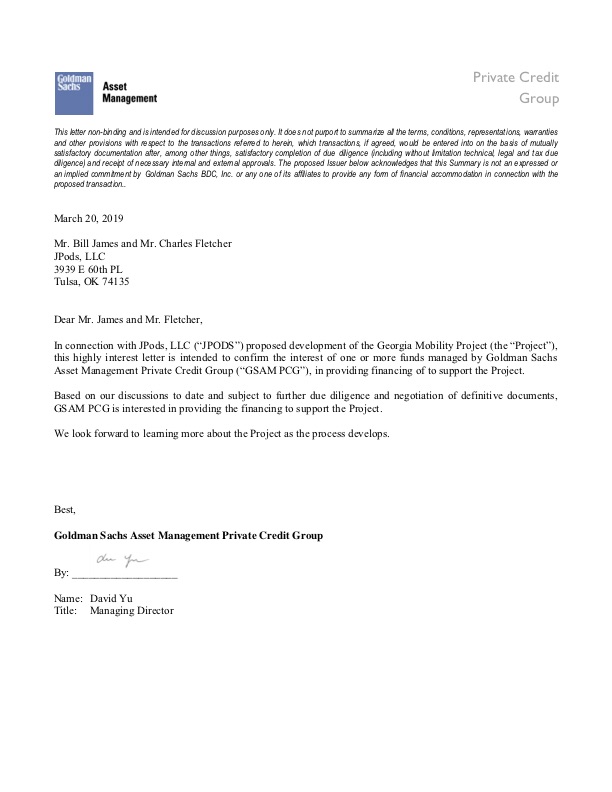///////////////// BEGIN 5X5 Standard ////////////////////
THEREFORE, BE IT RESOLVED, to encourage the shift from an oil-powered economy to a sustainable economy, the City of Barstow, CA shall regulate solar-powered mobility networks by the following 5X5 Standard:
The City welcomes requests to build solar-powered mobility networks that use public Rights of Ways. Unless rejected in writing within 30 days of plan submission, approval is granted to use City Rights of Way for 30 years to networks meeting the following requirements:
- Networks must be at least 5 times more efficient than current roads (Cars are at 24.6 mpg, so networks must be at least 125 miles per gallon).
- Networks must pay 5 percent of the gross transportation revenues to the aggregate rights-of-way holders.
- Networks must operate without government subsidies.
- Safety must exceed that of transportation modes already approved for use in the Rights of Way.
- Networks must be designed, fabricated, installed, insured, and inspected in compliance with California Division of Occupational Safety and Health and ASTM International F24 standards for Amusement Rides and Devices.
- Networks must comply with standard City and State Rights of Way laws as applied to other private networks that serve the public good.
- Networks must gather more than 2 megawatt-hours of renewable energy per network mile per typical day.
////////////////// END ////////////////////

Repeat the success of communications in power and transportation shift to standards-based regulations. Remove regulatory delays.
Rule of Law
- The Constitution is the primary Rule of Law in America.
- The Constitution Divided Sovereignty in the Preamble, as restated in Amendments 9 and 10:
- People retain all liberties not enumerated as sacrificed in written Constitutions.
- The federal government has unlimited taxing powers for the limited sovereignty of waging war and suppressing behaviors that build paths to war.
- The state governments are sovereign over issues of crimes, civil disputes, and other areas specifically enumerated in their constitutions.
Background:
Boston Tea Party resulted in the “post Roads” restriction in the Constitution. It forbids the mixing of Federal taxing for war-powers with taxing for commercial interests, “internal improvements.”
Federalist #45, Madison: “The powers delegated by the proposed Constitution to the federal government are few and defined. Those which are to remain in the State governments are numerous and indefinite. The former will be exercised principally on external objects, as war, peace, negotiation, and foreign commerce; with which last the power of taxation will, for the most part, be connected. The powers reserved to the several States will extend to all the objects which, in the ordinary course of affairs, concern the lives, liberties, and properties of the people, and the internal order, improvement, and prosperity of the State.”
- Since the 16th, 17th, and 18th Amendments and The Federal-Aid Highway Act of 1916, politicians mixed war-making with their commercial interests resulting in Civilization Killers of:
- Resource depletion – US Peak Oil was in 1970. Life requires energy. Less affordable oil, less life (Energy Economics).
- Eight Presidents issuing unanswered calls to action to end foreign oil addiction. The week of May 17, 2919, the Federal government:
- Mortgaged Posterity at $432 million/day.
- To import 7.2 million barrels the week.
- There is a great deal of misinformation in the US today about being “energy independent.”
- $22 trillion in Federal debt, rising in tandem with oil imports.
- Perpetual oil-wars since 1991.
- Terrorist attacks funded by oil-dollars.
- Climate Change
- $1.7 trillion/year in traffic costs.
- Enforcing the Constitution provides the path to creating millions of jobs converting traffic costs into value and preempting Civilization Killers. Restoring the Rule of Law in transportation today will repeat the benefits of restoring the Rule of Law in communications in 1982:
Federalist #62, Madison: “What prudent merchant will hazard his fortunes in any new branch of commerce when he knows not but that his plans may be rendered unlawful before they can be executed? What farmer or manufacturer will lay himself out for the encouragement given to any particular cultivation or establishment, when he can have no assurance that his preparatory labors and advances will not render him a victim to an inconstant government? In a word, no great improvement or laudable enterprise can go forward which requires the auspices of a steady system of national policy.”
